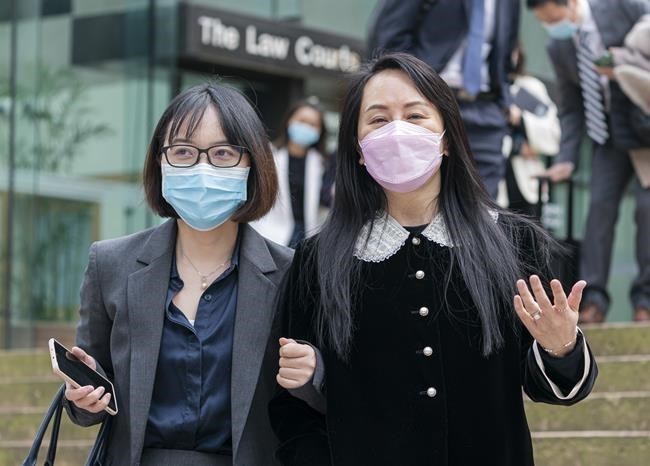VANCOUVER — Lawyers for Huawei executive Meng Wanzhou made what they said was an "unusual" request to admit new evidence in her extradition case Tuesday, but they argued the documents prove the United States has misled a Canadian court in its summary of the case against her.
Mark Sandler told a B.C. Supreme Court judge the documents obtained from HSBC, Meng's alleged victim, include internal email chains and spreadsheets that undermine the allegations of fraud against Meng.
Instead, the documents demonstrate the bank was aware of Huawei's control over Skycom and its business in Iran, Sandler argued.
"It is relatively rare that the person sought wishes to place before the court the purported victim's own records to impeach the threshold reliability of the prosecution's cases," he told Associate Chief Justice Heather Holmes.
It's unusual that a person sought in extradition proceedings is able to credibly challenge in a fraud prosecution whether the requesting state has even presented a plausible case to justify extradition, but Sandler said Meng's case is extraordinary.
"To be completely candid and transparent, we do not resile from characterizing this as an exceptional case that demands an exceptional remedy."
The two-day hearing over the admission of evidence is occurring just over a month before the final leg of hearings in Meng's extradition case are set to begin on Aug. 3.
Huawei's chief financial officer is accused of lying to HSBC about Huawei's control of Skycom, putting the bank at risk of violating U.S. sanctions against Iran.
Her arrest at Vancouver's airport in 2018 at the request of the United States fractured Canada's relations with China. Both she and Huawei deny the charges.
Sandler and his colleague Scott Fenton argued Tuesday that the record of the case against Meng prepared by U.S. prosecutors and shared with Canadian officials to justify her arrest was not an accurate description of HSBC's knowledge about Huawei's control over Skycom.
At least one senior HSBC executive was included on email chains discussing the relationship, contrary to the summary of allegations that said only junior bankers would have been aware of the link, the court heard.
The new evidence was recently obtained by Meng's team via a Hong Kong court. The redacted pages were released Tuesday after Holmes rejected Meng's application for a publication ban on the entirety of the documents.
Lawyer's for Canada's attorney general have not yet made their arguments to Holmes, but in court documents they say Meng's team is once again asking the court to act outside of its bounds by treating her extradition hearing as a full-fledged trial.
They also have a different interpretation of the documents, saying they simply confirm the U.S. evidence that Meng failed to communicate the true nature of the relationship between Huawei and the companies it controlled.
"The proposed evidence is incapable of demonstrating that any part of the various records of the case are unreliable," the written argument says.
The court has already found that the question of which HSBC personnel knew of Huawei's relationship with Skycom falls in the domain of the trial, it says.
"Given the limited role of the extradition judge in a committal hearing, the proposed evidence is irrelevant."
This report by The Canadian Press was first published June 29, 2021.
Amy Smart, The Canadian Press

